Since Nike has been in the sports and athletic apparel industry for many years, its position in the courtroom is nothing new. Nike's legal conflicts with other businesses have come to light more recently, including lawsuits against Warren Lotas, Kool Kiy, Bape, Lululemon, and StockX. With a sizable intellectual property portfolio, Nike is now actively filing lawsuits to defend its assets, including some of its most recognizable sneaker silhouettes, and is focusing on sellers of knockoff shoes. Since 2019, Nike has registered trade dress protection for 18 of its sneakers, including the Dunk, Air Force 1, and Air Jordan 1. Four more applications are still pending.
Lululemon
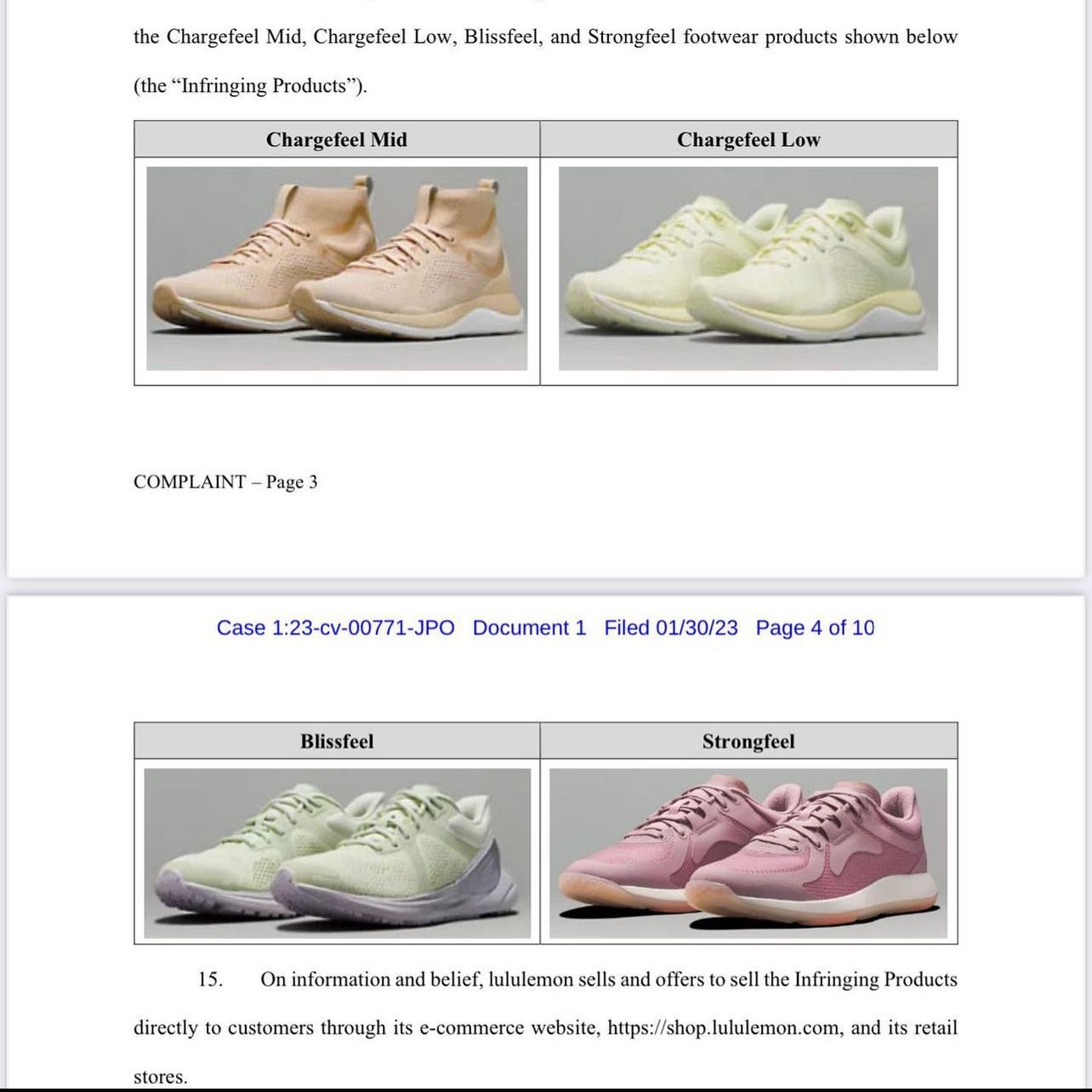
Three Nike patents regarding textiles with knitted elements and webbed areas are allegedly violated by the new footwear line from Lululemon, according to the lawsuit, which was submitted in January of this year. This development happens at the same time that Lululemon is growing its business by establishing a new footwear office in Portland, Oregon, not far from Nike's corporate headquarters.
According to the lawsuit, the footwear brand from Lululemon uses technology covered by the contested patents, which were granted to Nike between 2012 and 2017. In addition to monetary penalties, Nike has asked that Lululemon not be permitted to market any footwear that violates these copyrights.
It is important to note that Lululemon has not yet submitted a formal response to the lawsuit, so it is unclear how the business will counter these accusations. However, it is likely that the business will mount a tenacious defense given the stakes involved, both in terms of possible damages and the future of Lululemon's footwear line.
BAPE

A Bathing Ape, also known as Bape, was sued by Nike in January of this year on grounds of trademark violation. The lawsuit specifically alleges that Nike's Air Force 1, Jordan 1, and Dunk designs are "near verbatim copies" of Bape's goods, including their Bape Sta sneaker. In the lawsuit, Nike stated that it has trade dress protection for these designs, which covers the general appearance of the sneakers.
Lawyers for Bape have already started to oppose the case. They argued in a letter to the court that Nike has consistently withheld specific information regarding the alleged rights to the overall design of their sneakers over the past 14 years, which could hurt their case. The timeline is important because a company's trademark rights get weaker the longer it delays to use them.
Nike has escalated its criticism of Bape despite this resistance. Nike referred to Bape as a "serial copyist of Nike's iconic footwear designs" in response to Bape's letter and claimed that their arguments for trade dress protection are "more than adequate."
Although the Bape Sta shoe resembles the Nike Air Force 1 in appearance, the latter's distinguishing swoosh has been replaced by a shooting star. As trade dress protection can be challenging to establish when a design element is not exclusive to one brand, this may be a major point of contention in the case.
StockX
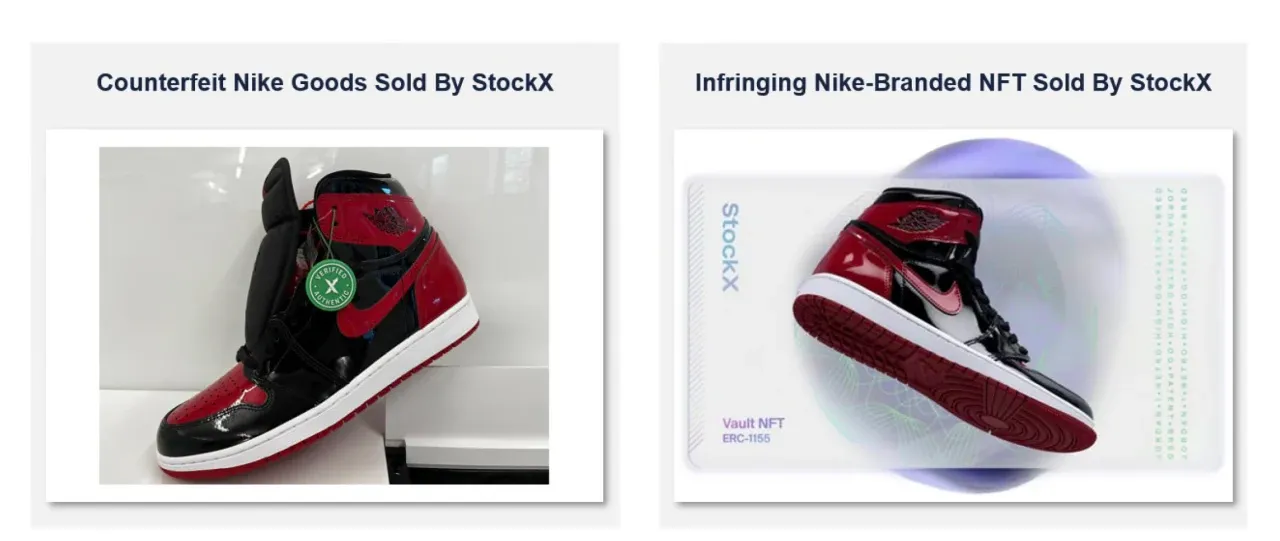
Non-fungible tokens (NFTs) have grown to be a well-liked method for buying and selling digital collectibles in recent years, including digital replicas of real-world things like sneakers. NFTs of Nike shoes were among the digital collectibles that the resale website StockX launched in January 2022 to break into the NFT market. When Nike sued StockX a month later, claiming trademark infringement, this action was however greeted with legal trouble.
Nike claimed that StockX was profiting from the unauthorized use of its brands by using NFTs that appeared to be "authorized by Nike when they are not" and to be manufactured by Nike. StockX responded by pointing out that its NFTs clearly display the StockX logo and do not infringe upon any legal rights of Nike. The business claimed that all it was doing was creating digital twins of the physical things it already owned so that people could store them in an online safe.
The dispute between Nike and StockX in court poses significant issues regarding who owns and can use trademarks in the NFT market. The question at hand is whether Nike's brand rights are violated by StockX's NFTs. Legal specialists contend that there is no simple solution to this problem.
Nike expanded the scope of its case against StockX in May 2022 by claiming that the company had bought at least four pairs of fake Nike sneakers from the website. This assertion sparked an ongoing argument among sneaker aficionados, with some contending that StockX's authentication procedure is not perfect and that fake goods may evade detection.
MSCHF
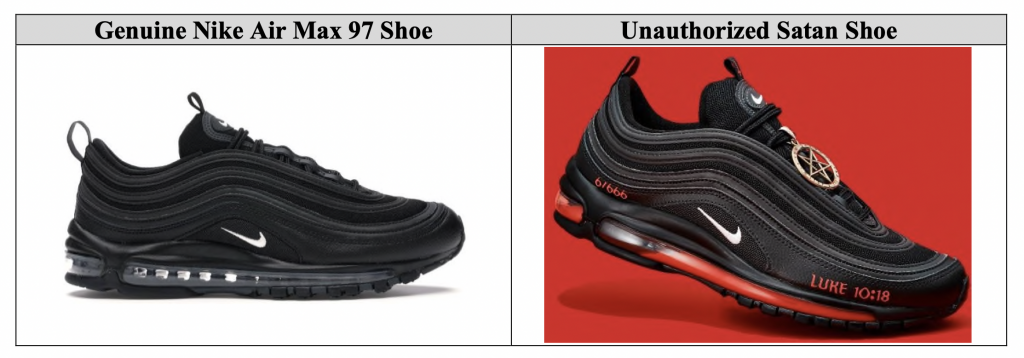
When the Brooklyn-based creative firm MSCHF sold 666 pairs of "Satan Shoes" in March 2021 that featured the Nike Air Max 97 silhouette, it caused a stir. The shoes, which were created in collaboration with the rapper Lil Nas X, were altered with a drop of human blood and crimson ink in the sole. The $1,018 set of shoes went on sale in less than a minute, sparking a social media frenzy.
Nike wasn't pleased, though. The business launched a lawsuit against MSCHF right away and requested that the sneakers be disposed of by a federal judge. Nike claimed that the Satan Shoes violated its trademark and might lead consumers to mistakenly believe that Nike had approved or supported the product. A few weeks later, the case was resolved, and MSCHF agreed to accept returns of the Satan Shoes in exchange for payment. The shoes were no longer for sale, but the details of the settlement were kept quiet.
Kool Kiy
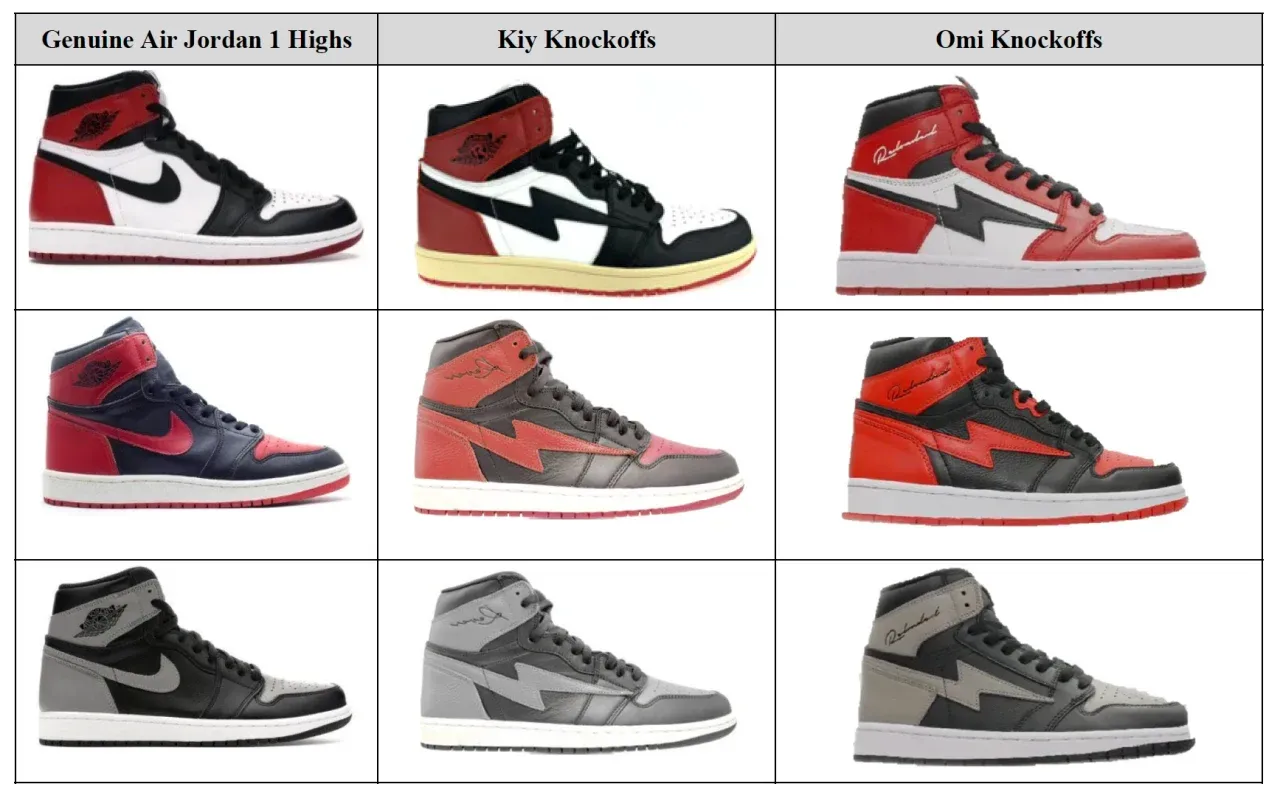
Nike sued Kool Kiy and a few of its business associates in November of last year, claiming that the defendants had violated the company's trade dress rights for the Air Jordan 1 and Dunk. A lightning bolt is used in place of the Nike swoosh in one of Kiy's well-known sneakers that resembles the Air Jordan 1 in appearance.
Kool Kiy took this legal move seriously, though. The company's lawyers attacked Nike as a "trademark troll" and claimed they had a "history of aggressive trademark litigation" in a fiery 69-page legal response they filed just this month. According to the response, Nike has used "unduly aggressive, disproportionate, highly burdensome litigation tactics against much smaller opponents," implying that it is using the legal system to oppress people rather than just settle disputes.
Additionally, Kool Kiy's legal team claimed that Nike has done "very little to police" some of the trademarks it claims Kool Kiy infringed upon and that the company's sneakers are "noticeably different" from Nike's. This is a similar defense to what Bape's lawyers used against Nike in a prior trademark infringement lawsuit.
Lil Gnar

The rapper Lil Gnar's clothing line, Gnarcotic, announced the impending release of sneakers in November 2022 that had an elephant print and an uncanny resemblance to Nike Dunks. Nike was not pleased with the similarities.
Following Gnarcotic's statement, Nike filed a lawsuit against the rapper's clothing line. The lawsuit claimed that Gnarcotic's shoes violated Nike's trade dress registrations for elephant print and Dunks, which were both filed in 2012 and 2009, respectively. Just three days later, the dispute was resolved, and Gnarcotic agreed to stop making any products that violated Nike's copyrights.
Drip Creationz
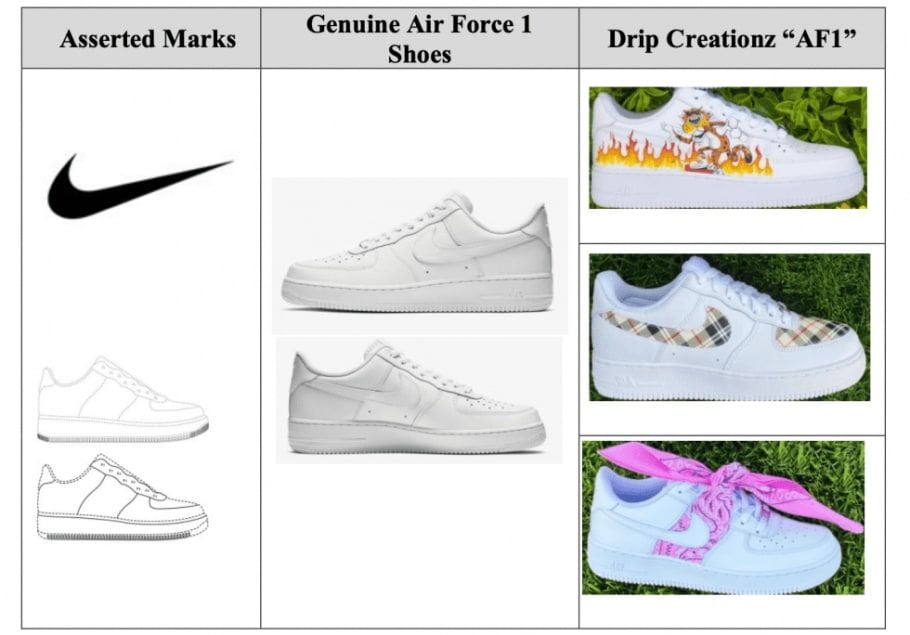
Nike sued Drip Creationz, a California-based business that specializes in modifying Nike Air Force 1 shoes, in July 2021. Nike claimed that Drip Creationz, also known as Customs by Ilene legally, was misleading customers by disassembling Air Force 1s and then reassembling them using various materials and sewing.
The question of intellectual property rights is at the center of the legal dispute between Nike and Drip Creationz. Nike, which has a history of defending its designs and trademarks, contends that Drip Creationz's customizations violate its intellectual property. Conversely, Drip Creationz feels that as long as it doesn't use Nike's trademarks in a confusing or deceptive manner, it is permitted to modify and resell Nike goods. The first-sale doctrine, which states that a person who purchases a trademarked work may sell it, was also used as evidence by the business to support its position. The jurors will determine whether Drip Creationz's modifications violated Nike's intellectual property rights when the case goes to trial in October.
KickRich
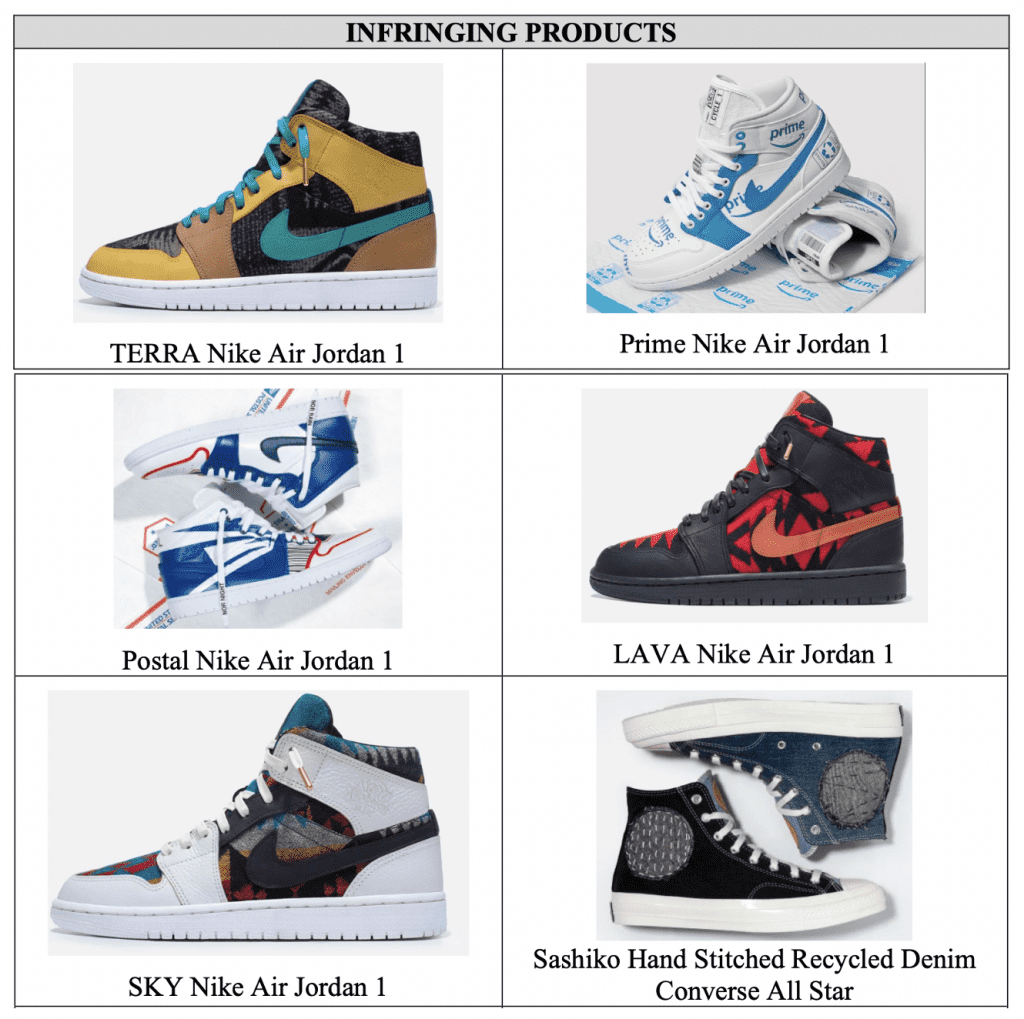
Beyond Drip Creationz, Nike has been involved in legal disputes over intellectual property infringement with KickRich, another shoe customizer. Nike sued KickRich on the same day that it sued Drip Creationz for marketing goods that it claimed infringed upon its trademarks and trade dress.
A sneaker that looked to be the result of a partnership between Nike and Amazon was one of the items sold by KickRich that Nike objected to. Nike claimed that this product and others sold by KickRich had the potential to confuse customers and trick them into thinking they were purchasing genuine Nike goods.
After several months of legal wrangling, Nike and KickRich reached a settlement in December 2021. According to a judgment agreed to by both parties and filed with the court, Nike agreed that KickRich could continue to customize Nike sneakers. However, KickRich agreed to stop selling any products that would "cause confusion" and "deceive persons into the erroneous belief" that KickRich was selling products licensed by Nike.
John Geiger
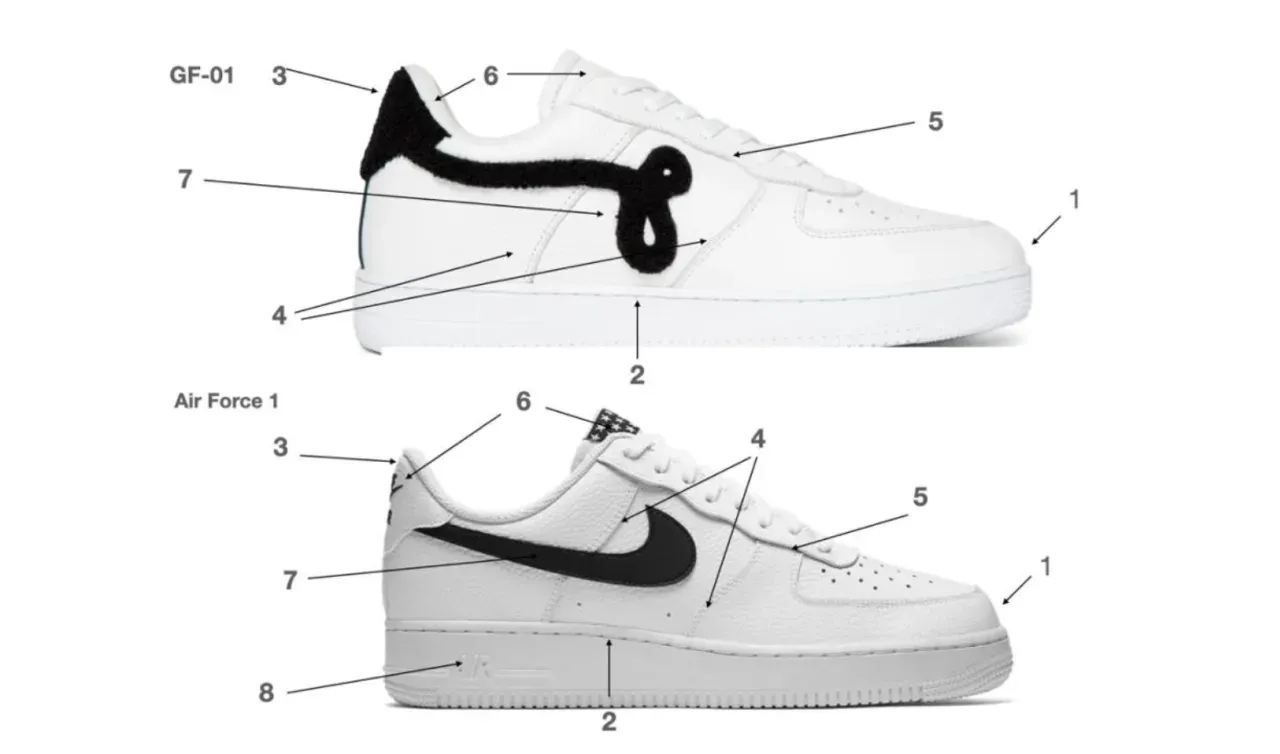
Nike gained notoriety in January 2021 when it filed a lawsuit against La La Land Production and Design for purportedly violating the company's trade dress protections for the Air Force 1 and Dunk sneakers. Later, Nike increased the number of parties it was suing to include independent creator and shoe designer John Geiger. Geiger had created a shoe called the GF-01 that was eerily similar to the Air Force 1 but featured a stylized "JG" in place of the swoosh.
The lawsuit claimed that Geiger and his associates "intentionally and willfully" produced a shoe with the intent to mislead customers into believing it to be a Nike product. A form of intellectual property that safeguards a product's distinctive visual appearance, Nike claimed that the shoe violated its trade dress protections.
Geiger, whose designs are renowned for being independent and edgy, defended himself against the claim by claiming that his sneaker was a special design that was different from the Air Force 1. Additionally, he contended that Nike's assertions represented an effort to stifle originality and restrict the ability of independent designers to produce cutting-edge goods. Geiger and his legal team fought back against Nike's allegations throughout the lengthy court proceeding, which lasted more than a year. However, the case was arbitrated out of court in August 2022. However, Geiger stated on his Instagram page that he was "happy to have this behind me" without providing the details of the settlement.
Warren Lotas
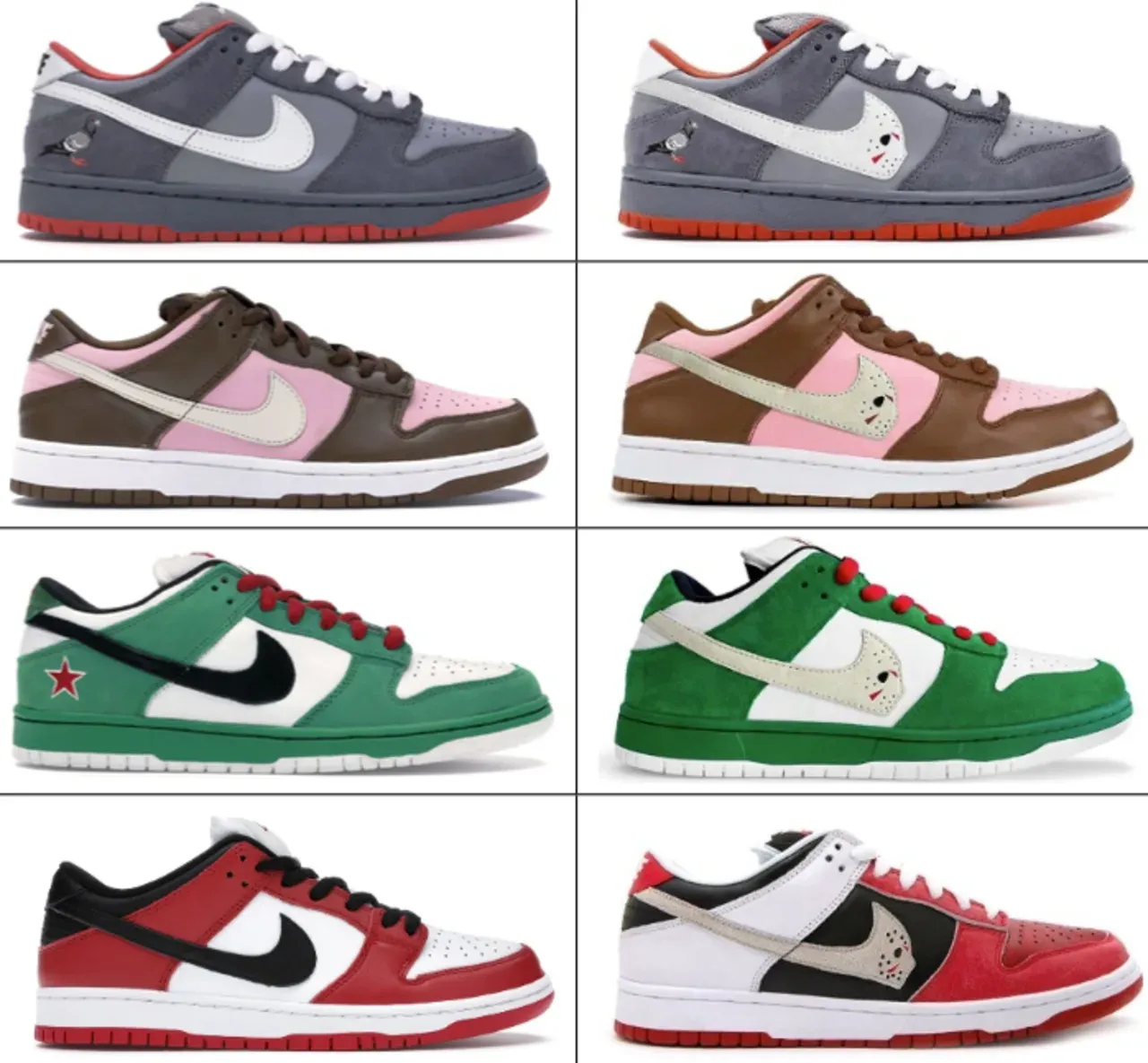
Nike sued streetwear designer Warren Lotas in October 2020 for marketing a shoe that looked a lot like the renowned Nike Dunk Staple NYC Pigeon, which was introduced in 2005 and is highly prized by sneaker collectors. A key component of shoe culture is the limited-edition Staple NYC Pigeon, which most recently sold for a staggering $38,000 on StockX. Nike launched a lawsuit, alleging that Lotas's copy of the shoe "embodies the DNA of sneaker culture" and that it is a fake that might mislead customers.
In 2020, Lotas promised to release his take on the Staple NYC Pigeon, which featured a barely modified swoosh and a design that alluded to the hockey mask from the Friday the 13th films. He advertised his design of the shoe as a "reinterpretation" of the original. Lotas made a number of defenses in reaction to Nike's lawsuit, one of which was that Nike had waited too long to assert its rights. However, the legal dispute was resolved in December 2020 when Lotas agreed to cease selling a number of products, including his version of the Staple NYC Pigeon, and to refrain from violating numerous Nike trademarks.